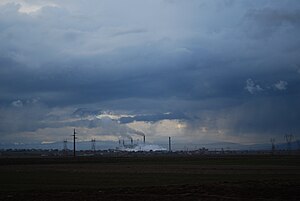Battle of Belaćevac Mine
| Battle of Belaćevac Mine | |||||||
|---|---|---|---|---|---|---|---|
| Part of the Kosovo War | |||||||
 Power plants outside Obilić |
|||||||
|
|||||||
| Belligerents | |||||||
|
|
|
||||||
| Strength | |||||||
| 30 | 100 | ||||||
| Casualties and losses | |||||||
| 10 killed | None | ||||||
| 9 Serb mineworkers abducted, presumed dead 2 Kosovo Albanian civilians killed, 6 wounded and c. 8,000 displaced |
|||||||
The Battle of Belaćevac Mine was a week-long clash between the Yugoslav Army (VJ), Serbian police (MUP) and the Kosovo Liberation Army (KLA) in June 1998, during the Kosovo War. It was fought over the Belaćevac coal mine, which powered two generating stations that supplied electricity to most of Kosovo.
The KLA seized the mine on 22 June, taking nine Serb mineworkers hostage, converting the mine into a base of operations and taunting the Yugoslav authorities by sending daylight patrols within sight of the provincial capital, Pristina. Over the next seven days, Yugoslav authorities and the KLA negotiated over the fate of the mineworkers. Once negotiations broke down, the VJ and MUP attacked the mine and forced the KLA out. Ten militants were killed in the clashes. The VJ and MUP reported suffering no casualties. Though the mine was recaptured, the hostages were nowhere to be found, and it is assumed they were killed by the militants. As of June 2014, the location of the mineworkers' remains is unknown. No one has ever been convicted of their deaths.
Following World War II, Kosovo was given the status of an autonomous province within the Socialist Republic of Serbia, one of six constitutional republics of the Socialist Federal Republic of Yugoslavia. After the death of Yugoslavia's long-time leader (Josip Broz Tito) in 1980, Yugoslavia's political system began to unravel. In 1989, Belgrade revoked Kosovo's autonomy. Kosovo, a province inhabited predominantly by ethnic Albanians, was of great historical and cultural significance to Serbs, who had formed a majority there before the mid-19th century, but by 1990 represented only about 10 percent of the population. Alarmed by their dwindling numbers, the province's Serbs began to fear that they were being "squeezed out" by the Albanians, and ethnic tensions worsened. As soon as Kosovo's autonomy was abolished, a minority government run by Serbs and Montenegrins was appointed by Serbian President Slobodan Milošević to oversee the province, enforced by thousands of heavily armed paramilitaries from Serbia-proper. Albanian culture was systematically repressed and hundreds of thousands of Albanians working in state-owned companies lost their jobs.
...
Wikipedia
